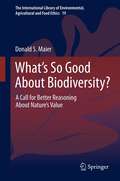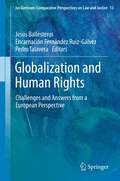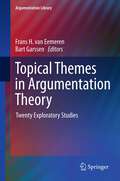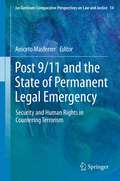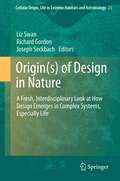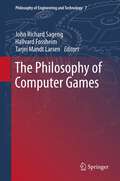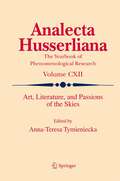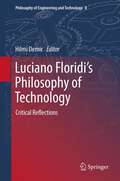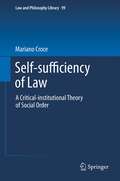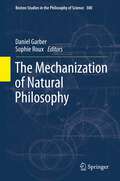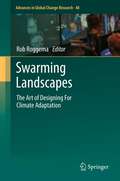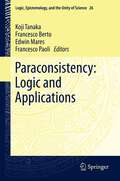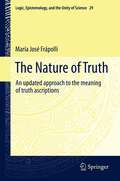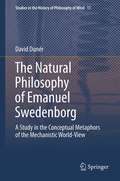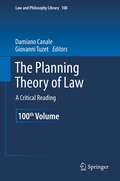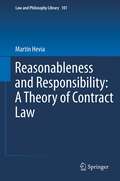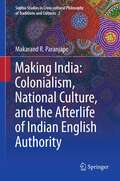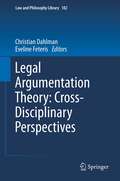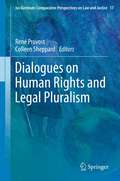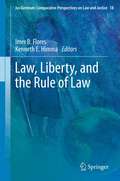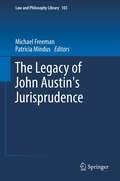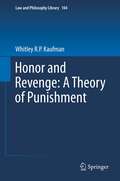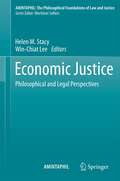- Table View
- List View
Rationis Defensor
by James MaclaurinRationis Defensor is to be a volume of previously unpublished essays celebrating the life and work of Colin Cheyne. Colin was until recently Head of the Department of Philosophy at the University of Otago, a department that can boast of many famous philosophers among its past and present faculty and which has twice been judged as the strongest research department across all disciplines in governmental research assessments. Colin is the immediate past President of the Australasian Association for Philosophy (New Zealand Division). He is the author of Knowledge, Cause, and Abstract Objects: Causal Objections to Platonism (Springer, 2001) and the editor, with Vladimir Svoboda and Bjorn Jespersen, of Pavel Tichy's Collected Papers in Logic and Philosophy (University of Otago Press, 2005) and, with John Worrall, of Rationality and Reality: Conversations with Alan Musgrave (Springer, 2006). This volume celebrates the dedication to rational enquiry and the philosophical style of Colin Cheyne. It also celebrates the distinctive brand of naturalistic philosophy for which Otago has become known. Contributors to the volume include a wide variety of philosophers, all with a personal connection to Colin, and all of whom are, in their own way, defenders of rationality.
What's So Good About Biodiversity?: A Call for Better Reasoning About Nature's Value
by Donald S. MaierThere has been a deluge of material on biodiversity, starting from a trickle back in the mid-1980's. However, this book is entirely unique in its treatment of the topic. It is unique in its meticulously crafted, scientifically informed, philosophical examination of the norms and values that are at the heart of discussions about biodiversity. And it is unique in its point of view, which is the first to comprehensively challenge prevailing views about biodiversity and its value. According to those dominant views, biodiversity is an extremely good thing - so good that it has become the emblem of natural value. The book's broader purpose is to use biodiversity as a lens through which to view the nature of natural value. It first examines, on their own terms, the arguments for why biodiversity is supposed to be a good thing. This discussion cuts a very broad and detailed swath through the scientific, economic, and environmental literature. It finds all these arguments to be seriously wanting. Worse, these arguments appear to have consequences that should dismay and perplex most environmentalists. The book then turns to a deeper analysis of these failures and suggests that they result from posing value questions from within a framework that is inappropriate for nature's value. It concludes with a novel suggestion for framing natural value. This new proposal avoids the pitfalls of the ones that prevail in the promotion of biodiversity. And it exposes the goals of conservation biology, restoration biology, and the world's largest conservation organizations as badly ill-conceived.
Globalization and Human Rights
by Jesús Ballesteros Encarnación Fernández Ruiz-Gálvez Pedro TalaveraGlobalisation turns out to be untenable because it does not guarantee minimum social equity, peace and respect for the environment, and therefore does not guarantee the effective accomplishment of human rights. This book analyzes this issue and raises proposals for a new perspective. The first part describes the soft threats to human rights, derived from the devaluation of the politics and the productive economy with regard to the finance. It entails the concealment of the reality in the shape of exploitation as the tax havens and in the shape of marginalization of the persons with different abilities. The second part include a study of hard threats to human rights and examines two cases of failed states: Afghanistan and Somalia, in which the violence has supplanted the politics and the economy. In view of these situations it is necessary to rethink the force of classic ius gentium and the humanitarian right. The third part presents the European Union as a legal and political space in which conditions of a worthy life are better defended by means of the Primacy of Practical Reason and Social State of Law, and by the requirement of peace as the main rule of international relations.
Topical Themes in Argumentation Theory
by Frans H. van Eemeren Bart GarssenTopical Themes in Argumentation Theory brings together twenty exploratory studies on important subjects of research in contemporary argumentation theory. The essays are based on papers that were presented at the 7th Conference of the International Society for the Study of Argumentation (ISSA) in Amsterdam in June 2010. They give an impression of the nature and the variety of the kind of research that has recently been carried out in the study of argumentation.The volume starts with three essays that provide stimulating theoretical perspectives on argumentation. Subsequently, some views are explained on the intriguing topics of 'dissensus' and 'deep disagreement'. After a discussion of three different approaches to the treatment of types of argumentation some classical themes from antique argumentation theory are revisited. The new research area of visual argumentation is explored in the next part. The volume concludes with three reports of experimental studies concerning argumentative discourse. The volume starts with three essays that provide stimulating theoretical perspectives on argumentation. Subsequently, some views are explained on the intriguing topics of 'dissensus' and 'deep disagreement'. After a discussion of three different approaches to the treatment of types of argumentation some classical themes from antique argumentation theory are revisited. The new research area of visual argumentation is explored in the next part. The volume concludes with three reports of experimental studies concerning argumentative discourse. The volume starts with three essays that provide stimulating theoretical perspectives on argumentation. Subsequently, some views are explained on the intriguing topics of 'dissensus' and 'deep disagreement'. After a discussion of three different approaches to the treatment of types of argumentation some classical themes from antique argumentation theory are revisited. The new research area of visual argumentation is explored in the next part. The volume concludes with three reports of experimental studies concerning argumentative discourse.
Post 9/11 and the State of Permanent Legal Emergency
by Aniceto MasferrerThe terrorist attacks occurred in the United States on 11 September 2001 have profoundly altered and reshaped the priorities of criminal justice systems around the world. Atrocities like the 9/11 attacks, the Madrid train bombings of March 2003, and the terrorist act to the United Kingdom of July 2005 threatened the life of democratic nations. The volume explores the response of democratic nation-states to the problems of terrorism and counter-terrorism within the framework of the Rule of Law. One of the primary subjects of study is the ways in which the interests of the state (security from external threats, the maintenance of civil peace, and the promotion of the commonwealth) are balanced or not with the liberty and freedom of the citizens of the state. The distinctive aspect of this focus is that it brings a historical, political, philosophical and comparative approach to the contemporary shape and purposes of the criminal justice systems around the world.
Origin(s) of Design in Nature
by Liz Swan Richard Gordon Joseph SeckbachOrigin(s) of Design in Nature is a collection of over 40 articles from prominent researchers in the life, physical, and social sciences, medicine, and the philosophy of science that all address the philosophical and scientific question of how design emerged in the natural world. The volume offers a large variety of perspectives on the design debate including progressive accounts from artificial life, embryology, complexity, cosmology, theology and the philosophy of biology. This book is volume 23 of the series, Cellular Origin, Life in Extreme Habitats and Astrobiology. www.springer.com/series/5775
The Philosophy of Computer Games
by Tarjei Mandt Larsen John Richard Sageng Hallvard J FossheimComputer games have become a major cultural and economic force, and a subject of extensive academic interest. Up until now, however, computer games have received relatively little attention from philosophy. Seeking to remedy this, the present collection of newly written papers by philosophers and media researchers addresses a range of philosophical questions related to three issues of crucial importance for understanding the phenomenon of computer games: the nature of gameplay and player experience, the moral evaluability of player and avatar actions, and the reality status of the gaming environment. By doing so, the book aims to establish the philosophy of computer games as an important strand of computer games research, and as a separate field of philosophical inquiry. The book is required reading for anyone with an academic or professional interest in computer games, and will also be of value to readers curious about the philosophical issues raised by contemporary digital culture.
Art, Literature, and Passions of the Skies: Art, Literature, And Passions Of The Skies (Analecta Husserliana #112)
by Anna Teresa TymienieckaFlashes of lightning, resounding thunder, gloomy fog, brilliant sunshine...these are the life manifestations of the skies. The concrete visceral experiences that living under those skies stir within us are the ground for individual impulses, emotions, sentiments that in their interaction generate their own ever-changing clouds. While our intellect concentrates on the discovery of our cosmic position, on the architecture of the universe, our imagination is informed by the gloomy vapors, the glimmers of fleeting light, and the glory of the skies. Reconnoitering from the soil of human life and striving towards the infinite, the elan of imagination gets caught up in the clouds of the skies. There in that dimness, sensory receptivity, dispositions, emotions, passionate strivings, yearnings, elevations gather and propagate. From the "Passions of the Skies" spring innermost intuitions that nourish literature and the arts.
Luciano Floridi’s Philosophy of Technology
by Hilmi DemirInformation and communication technologies of the 20th century have had a significant impact on our daily lives. They have brought new opportunities as well as new challenges for human development. The Philosopher: Luciano Floridi claims that these new technologies have led to a revolutionary shift in our understanding of humanity's nature and its role in the universe. Florodi's philosophical analysis of new technologies leads to a novel metaphysical framework in which our understanding of the ultimate nature of reality shifts from a materialist one to an informational one. In this world, all entities, be they natural or artificial, are analyzed as informational entities. This book provides critical reflection to this idea, in four different areas: Information Ethics and The Method of Levels of Abstraction The Information Revolution and Alternative Categorizations of Technological Advancements Applications: Education, Internet and Information Science Epistemic and Ontic Aspects of the Philosophy of Information
Self-sufficiency of Law
by Mariano CroceThe book investigates the role of law and legal experts in the organisational dynamics of a population, demonstrating that law is a stable practice among those who (in virtue of the special knowledge they master) are called upon to select the 'normative facts' of a population, i.e. the interactional standards that are proclaimed as binding for the entire population by the publicly recognised legal experts (whose peremptory judgments can be only revised by peers). It proposes an integration of the recent research outcomes achieved in three different areas of study: legal positivism, legal institutionalism and legal pluralism and examines the notions of rule, coercion, institution, practice elaborated by significant theorists in the mentioned areas and illumine both their merits and flaws. Furthermore it advances a notion of law and a description of the legal field which are able to account for the nature of the legal filed as the cradle of the social order. new back cover copy: In an era characterized by a streaking global pluralism, the collapse of many state agencies, the emergence of multiple sources of law, and the rise of informal justice, the idea of a unitary and homogenous legal system seems old-fashioned. But philosophers, sociologists and anthropologists still hold many debates on the nature of law and its function, which is that law represents an institution that characterizes any orderly social context of human beings, and this book plunges into the center of those debates. Self-sufficiency of Law: A Critical-institutional Theory of Social Order investigates the role of law and legal experts in the organizational dynamics of a population. It demonstrates that law is a stable practice among those who are called upon to select the "normative facts" of a population, that is, the interactional standards that are proclaimed as binding for the entire population by the publicly recognized legal experts. To do this, the author proposes an integration of the recent research outcomes achieved in three different areas of study--legal positivism, legal institutionalism and legal pluralism. He examines the notions of rule, coercion, institution and practice elaborated on by significant theorists in these fields, highlighting both the merits and flaws and ultimately advancing a notion of law and a description of the legal field which are able to account for the nature of the legal field as the cradle of social order. This text covers key guidelines for empirical research and political activities in Western and non-Western countries.
The Mechanization of Natural Philosophy
by Dan Garber Sophie RouxThe Mechanisation of Natural Philosophy is devoted to various aspects of the transformation of natural philosophy during the 16th and 17th centuries that is usually described as mechanical philosophy .Drawing the border between the old Aristotelianism and the « new » mechanical philosophy faces historians with a delicate task, if not an impossible mission. There were many natural philosophers who actually crossed the border between the two worlds, and, inside each of these worlds, there was a vast spectrum of doctrines, arguments and intellectual practices. The expression mechanical philosophy is burdened with ambiguities. It may refer to at least three different enterprises: a description of nature in mathematical terms; the comparison of natural phenomena to existing or imaginary machines; the use in natural philosophy of mechanical analogies, i.e. analogies conceived in terms of matter and motion alone.However mechanical philosophy is defined, its ambition was greater than its real successes. There were few mathematisations of phenomena. The machines of mechanical philosophers were not only imaginary, but had little to do with the machines of mecanicians. In most of the natural sciences, analogies in terms of matter and motion alone failed to provide satisfactory accounts of phenomena.By the same authors: Mechanics and Natural Philosophy before the Scientific Revolution (Boston Studies in the Philosophy of Science 254).
Swarming Landscapes
by Rob RoggemaThis book advocates a fresh approach to planning that anticipates, rather than reacts to, the changes in climate currently in process. Today's spatial planning procedures rely on historical evidence instead of preparing for factors that by definition lie in the future, yet which are relatively uncontroversial: shortages of water, sea level rise and rises in average temperatures being but three examples. Arguing for more flexibility, the contributors view 'complexity' as the key to transforming the way we plan in order to better equip us to face uncertainties about our future environment.
Paraconsistency: Logic and Applications
by Edwin Mares Francesco Berto Francesco Paoli Koji TanakaA logic is called 'paraconsistent' if it rejects the rule called 'ex contradictione quodlibet', according to which any conclusion follows from inconsistent premises. While logicians have proposed many technically developed paraconsistent logical systems and contemporary philosophers like Graham Priest have advanced the view that some contradictions can be true, and advocated a paraconsistent logic to deal with them, until recent times these systems have been little understood by philosophers. This book presents a comprehensive overview on paraconsistent logical systems to change this situation. The book includes almost every major author currently working in the field. The papers are on the cutting edge of the literature some of which discuss current debates and others present important new ideas. The editors have avoided papers about technical details of paraconsistent logic, but instead concentrated upon works that discuss more "big picture" ideas. Different treatments of paradoxes takes centre stage in many of the papers, but also there are several papers on how to interpret paraconistent logic and some on how it can be applied to philosophy of mathematics, the philosophy of language, and metaphysics.
The Nature of Truth
by Maria Jose FrapolliThe book offers a characterization of the meaning and role of the notion of truth in natural languages and an explanation of why, in spite of the big amount of proposals about truth, this task has proved to be resistant to the different analyses. The general thesis of the book is that defining truth is perfectly possible and that the average educated philosopher of language has the tools to do it. The book offers an updated treatment of the meaning of truth ascriptions from taking into account the latest views in philosophy of language and linguistics.
The Natural philosophy of Emanuel Swedenborg
by David DunérAlthough Emanuel Swedenborg (1688-1772) is commonly known for his spiritual philosophy, his early career was focused unnatural science. During this period, Swedenborg thought of the world was like a gigantic machine, following the laws of mechanics and geometry. This volume analyzes this mechanistic worldview from the cognitive perspective, by means of a study of the metaphors in Swedenborg's texts. The author argues that these conceptual metaphors are vital skills of the creative mind and scientific thinking, used to create visual analogies and abstract ideas. This means that Swedenborg's mechanistic and geometrical worldview, allowed him to perceive the world as mechanical and geometrical. Swedenborg thought "with" books and pens. The reading gave him associations and clues, forced him to interpret, and gave him material for his intellectual development.
The Planning Theory of Law
by Damiano Canale Giovanni TuzetThis collection of essays is the outcome of a workshop with Scott Shapiro on The Planning Theory of Law that took place in December 2009 at Bocconi University. It brings together a group of scholars who wrote their contributions to the workshop on a preliminary draft of Shapiro's Legality. Then, after the workshop, they wrote their final essays on the published version of the book. The contributions clearly highlight the difference of the continental and civil law perspective from the common law background of Shapiro but at the same time the volume tries to bridge the gap between the two. The essays provide a critical reading of the planning theory of law, highlighting its merits on the one hand and objecting to some parts of it on the other hand. Each contribution discusses in detail a chapter of Shapiro's book and together they cover the whole of Shapiro's theory. So the book presents a balanced and insightful discussion of the arguments of Legality.
Reasonableness and Responsibility: A Theory of Contract Law
by Martín HeviaIf, as John Rawls famously suggests, justice is the first virtue of social institutions, how are we to understand the institution of contract law? This book proposes a Rawlsian theory of contract law. It argues that justice requires that we understand contract rules in terms of the idea of reasonable, terms of interaction - that is, terms that would be accepted by reasonable persons moved by a desire for a social world in which they, as free and equal, can cooperate with others on terms they accept. On that basis, the book explains the main doctrines of contract law, including those governing third parties, in both the Common Law and the Civil Law.
Making India: Colonialism, National Culture, and the Afterlife of Indian English Authority
by Makarand R. ParanjapeCompared to how it looked 150 years ago at the eve of the colonial conquest, today's India is almost completely unrecognizable. A sovereign nation, with a teeming, industrious population, it is an economic powerhouse and the world's largest democracy. It can boast of robust legal institutions and a dizzying plurality of cultures, in addition to a lively and unrestricted print and electronic media. The question is how did it get to where it is now? Covering the period from 1800 to 1950, this study of about a dozen makers of modern India is a valuable addition to India's cultural and intellectual history. More specifically, it shows how through the very act of writing, often in English, these thought leaders reconfigured Indian society. The very act of writing itself became endowed with almost a charismatic authority, which continued to influence generations that came after the exit of the authors from the national stage. By examining the lives and works of key players in the making of contemporary India, this study assesses their relationships with British colonialism and Indian traditions. Moreover, it analyzes how their use of the English language helped shape Indian modernity, thus giving rise to a uniquely Indian version of liberalism. The period was the fiery crucible from which an almost impossibly diverse and pluralistic new nation emerged through debate, dialogue, conflict, confrontation, and reconciliation. The author shows how the struggle for India was not only with British colonialism and imperialism, but also with itself and its past. He traces the religious and social reforms that laid the groundwork for the modern sub-continental state, proposed and advocated in English by the native voices that influenced the formation India's society. Merging culture, politics, language, and literature, this is a path breaking volume that adds much to our understanding of a nation that looks set to achieve much in the coming century.
Legal Argumentation Theory: Cross-Disciplinary Perspectives
by Christian Dahlman Eveline FeterisThis book offers its readers an overview of recent developments in the theory of legal argumentation written by representatives from various disciplines, including argumentation theory, philosophy of law, logic and artificial intelligence. It presents an overview of contributions representative of different academic and legal cultures, and different continents and countries. The book contains contributions on strategic maneuvering, argumentum ad absurdum, argumentum ad hominem, consequentialist argumentation, weighing and balancing, the relation between legal argumentation and truth, the distinction between the context of discovery and context of justification, and the role of constitutive and regulative rules in legal argumentation. It is based on a selection of papers that were presented in the special workshop on Legal Argumentation organized at the 25th IVR World Congress for Philosophy of Law and Social Philosophy held 15-20 August 2011 in Frankfurt, Germany.
Dialogues on Human Rights and Legal Pluralism
by Colleen Sheppard René ProvostHuman rights have transformed the way in which we conceive the place of the individual within the community and in relation to the state in a vast array of disciplines, including law, philosophy, politics, sociology, geography. The published output on human rights over the last five decades has been enormous, but has remained tightly bound to a notion of human rights as dialectically linking the individual and the state. Because of human rights' dogged focus on the state and its actions, they have very seldom attracted the attention of legal pluralists. Indeed, some may have viewed the two as simply incompatible or relating to wholly distinct phenomena. This collection of essays is the first to bring together authors with established track records in the fields of legal pluralism and human rights, to explore the ways in which these concepts can be mutually reinforcing, delegitimizing, or competing. The essays reveal that there is no facile conclusion to reach but that the question opens avenues which are likely to be mined for years to come by those interested in how human rights can affect the behaviour of individuals and institutions.
Law, Liberty, and the Rule of Law
by Imer B. Flores Kenneth E. HimmaIn recent years, there has been a substantial increase in concern for the rule of law. Not only have there been a multitude of articles and books on the essence, nature, scope and limitation of the law, but citizens, elected officials, law enforcement officers and the judiciary have all been actively engaged in this debate. Thus, the concept of the rule of law is as multifaceted and contested as it's ever been, and this book explores the essence of that concept, including its core principles, its rules, and the necessity of defining, or even redefining, the basic concept. Law, Liberty, and the Rule of Law offers timely and unique insights on numerous themes relevant to the rule of law. It discusses in detail the proper scope and limitations of adjudication and legislation, including the challenges not only of limiting legislative and executive power via judicial review but also of restraining active judicial lawmaking while simultaneously guaranteeing an independent judiciary interested in maintaining a balance of power. It also addresses the relationship not only between the rule of law, human rights and separation of powers but also the rule of law, constitutionalism and democracy.
The Legacy of John Austin's Jurisprudence
by Michael Freeman Patricia MindusThis is the first ever collected volume on John Austin, whose role in the founding of analytical jurisprudence is unquestionable. After 150 years, time has come to assess his legacy. The book fills a void in existing literature, by letting top scholars with diverse outlooks flesh out and discuss Austin's legacy today. A nuanced, vibrant, and richly diverse picture of both his legal and ethical theories emerges, making a case for a renewal of interest in his work. The book applies multiple perspectives, reflecting Austin's various interests - stretching from moral theory to theory of law and state, from Roman Law to Constitutional Law - and it offers a comparative outlook on Austin and his legacy in the light of the contemporary debate and major movements within legal theory. It sheds new light on some central issues of practical reasoning: the relation between law and morals, the nature of legal systems, the function of effectiveness, the value-free character of legal theory, the connection between normative and factual inquiries in the law, the role of power, the character of obedience and the notion of duty.
Honor and Revenge: A Theory of Punishment
by Whitley R.P. KaufmanThis book addresses the problem of justifying the institution of criminal punishment. It examines the "paradox of retribution": the fact that we cannot seem to reject the intuition that punishment is morally required, and yet we cannot (even after two thousand years of philosophical debate) find a morally legitimate basis for inflicting harm on wrongdoers. The book comes at a time when a new "abolitionist" movement has arisen, a movement that argues that we should give up the search for justification and accept that punishment is morally unjustifiable and should be discontinued immediately. This book, however, proposes a new approach to the retributive theory of punishment, arguing that it should be understood in its traditional formulation that has been long forgotten or dismissed: that punishment is essentially a defense of the honor of the victim. Properly understood, this can give us the possibility of a legitimate moral justification for the institution of punishment.
The Inherent Right of Self-Defence in International Law
by Murray Colin AlderDetermining the earliest point in time at which international law authorises a state to exercise its inherent right of self-defence is an issue which has been debated, but unsatisfactorily reasoned, by scholars and states since the 1960's. Yet it remains arguably the most pressing question of law that faces the international community. This book unravels the legal and factual complications which have obscured the answer to this question. In contrast to most other works, it takes an historic approach by tracing the evolution of the rights, rules and principles of international law which have governed the use of force by states since the 16th century. Its emphasis on self-defence provides the reader with a new and complete understanding of how and why the international legal framework limits defensive force to repelling an imminent threat or use of offensive force which is directed at the territory of a state. Taking an historic approach enables this book to resurrect an understanding of the human defensive instinct which has guided the formation of the international law of self-defence. It also explains the true legal nature and scope of the inherent right of self-defence, of anticipatory self-defence and provides a definition of the legal commencement of an armed attack for the purpose of Article 51 of the Charter. Finally, the reader will receive a unique source of research materials and analysis of state practice and of scholarly works concerning self-defence and the use of force since the 16th century, which is suitable for all readers of international law around the world.
Economic Justice: Philosophical and Legal Perspectives
by Helen M. Stacy Win Chiat LeeThe economic impact of the U. S. financial market meltdown of 2008 has been devastating both in the U. S. and worldwide. One consequence of this crisis is the widening gap between rich and poor. With little end in sight to global economic woes, it has never been more urgent to examine and re-examine the values and ideals that animate policy about the market, the workplace, and formal and informal economic institutions at the level of the nation state and internationally. Re-entering existing debates and provoking new ones about economic justice, this volume makes a timely contribution to a normative assessment of our economic values and the institutions that active those norms. Topics covered by this volumes essays range from specific or relatively small-scale problems such as payday lending and prisoners' access to adequate healthcare; to large-scale such as global poverty, the free market and international aid. Economic Justice will stimulate and provoke philosophers, policy makers, the engaged readers who and better outcomes from financial institutions and more effect distribution of economic goods.

